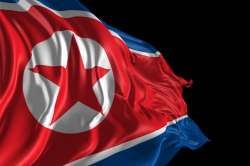Nuclear-armed North Korea profits from US, EU seafood sales
American companies are not allowed to import products made by North Korean workers anywhere in the world, under a law signed by President Donald Trump in early August.

The workers wake up each morning on metal bunk beds in fluorescent-lit Chinese dormitories, North Koreans outsourced by their government to process seafood that ends up in American stores and homes.
Privacy is forbidden. They cannot leave their compounds without permission. They must take the few steps to the factories in pairs or groups, with North Korean minders ensuring no one strays. They have no access to telephones or email. And they are paid a fraction of their salaries, while the rest — as much as 70 percent — is taken by North Korea’s government.
This means Americans buying salmon for dinner at Walmart or ALDI may inadvertently have subsidized the North Korean government as it builds its nuclear weapons program, an AP investigation has found. Their purchases may also have supported what the United States calls “modern day slavery” — even if the jobs are highly coveted by North Koreans.
At a time when North Korea faces sanctions on many exports, the government is sending tens of thousands of workers worldwide, bringing in revenue estimated at anywhere from $200 million to $500 million a year. That could account for a sizable portion of North Korea’s nuclear weapons and missile programs, which South Korea says have cost more than $1 billion.
While the presence of North Korean workers overseas has been documented, the AP investigation reveals for the first time that some products they make go to the United States, which is now a federal crime. AP also tracked the products made by North Korean workers to Canada, Germany and elsewhere in the European Union.
In addition to seafood, AP found North Korean laborers making wood flooring and sewing garments in factories in Hunchun. Those industries also export to the U.S. from Hunchun, but AP did not track specific shipments except for seafood.
American companies are not allowed to import products made by North Korean workers anywhere in the world, under a law signed by President Donald Trump in early August. Importers or company officials could face criminal charges for using North Korean workers or materially benefiting from their work, according to the law.
Every Western company involved that responded to AP’s requests for comment said forced labor and potential support for North Korea’s weapons program were unacceptable in their supply chains. Many said they were going to investigate, and some said they had already cut off ties with suppliers.
John Connelly, president of the National Fisheries Institute, the largest seafood trade association in the U.S., said his group was urging all of its companies to immediately re-examine their supply chains “to ensure that wages go to the workers, and are not siphoned off to support a dangerous dictator.”
“While we understand that hiring North Korean workers may be legal in China,” said Connelly, “we are deeply concerned that any seafood companies could be inadvertently propping up the despotic regime.”
In response to the investigation, Senate leaders said Wednesday that the U.S. needs to keep products made by North Koreans out of the United States and get China to refuse to hire North Korean workers.
“The administration needs to ramp up the pressure on China to crack down on trade with North Korea across the board,” said top Senate Democrat Chuck Schumer.